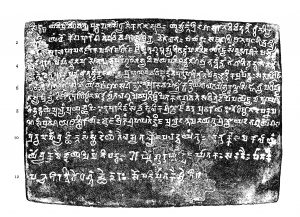
1) Luck!
Verse 1) May that sun, the store of rays that cleave as under the sheath of the world (viz., darkness) protect you—whom Brāhmaṇas, with minds enlightened, praise, according to the rite in (their) uniform course of meditation—whose end, either vertically or transversely, neither the gods nor the demons could ascertain— (and) by having recourse to whom, mankind, when they are helpless through the intense virulence of disease, acquire consciousness (again)!
3-5) When a century of years augmented by forty-six (has elapsed), pertaining to the increasingly victorious reign of the Paramabhaṭṭāraka mahārājādhirāja, the prosperous Skandagupta, and when the month of Phālguna is current, for the augmentation of the enjoyment (of power), in Antarvedi, of the Viṣayapati Śarvanāga, who has been favoured by that venerable (king);
5-8) the Devaviṣṇu, who belongs to (the) community of Chaturvedins of Padmā relating to Indrāpura, who is the son of Deva, (and) the son’s son of Haṛtrāta, (and) the son of the son’s son of Ḍuḍika—who always maintains the sacred fire and is a student of the Sāmaveda, who belongs to the Rāṇāyana school—and who is of the Varṣagaṇagotra, for the increase of his own fame, gives an endowment, (of which the interest is) to be applied to (the maintenance of) a lamp for (the temple of) the divine Sun, established by Acalavarman and Bhrukuṇṭhasiṅha, Kṣatṛya merchants of the town of Indrāpura, just touching māḍāsyāta in the east of that town.
8-10) Whatever has been given through the Brāhmaṇa’s endowment to (the temple of) the Sun is perpetual from the guild of oil-men, residing at Indrāpura, of which Jīvanta is the head and wherever it (i.e., the guild) may settle down after moving away from this town and entering (some other place). There should then be given by this guild, for the same time as the moon and the sun (endure), two palas of oil by weight (or in figures) by weight 2, uninterrupted in fulfilment (and) continuing without any diminution from the original value.
11-12) Whosoever transgresses this grant that has been drawn up, that man, (becoming as guilty as) the slayer of a cow, (or) the slayer of a spiritual preceptor, (or) the slayer of a Brāhmaṇa, shall go to the infernal region, being overpowered with those (well-known) five sins, together with the minor sins.